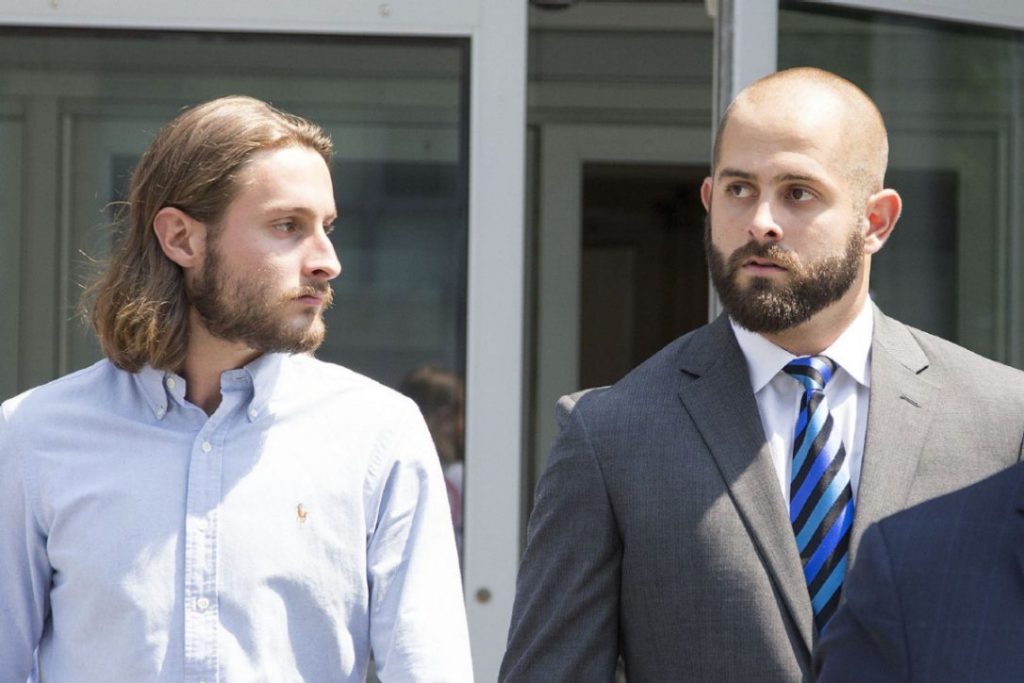Const. Michael Theriault was supposed to testify at a short impaired driving trial on July 20. He didn’t show up.

According to a judge, “there has been no satisfactory explanation” put forward for why Const. Michael Theriault, right, failed to show up to testify in an impaired driving case in which he was the arresting officer. In a separate case, Theriault and his brother Christian, left, are charged in the beating of teenager Dafonte Miller. (Carlos Osorio / Toronto Star file photo)
Theriault, the officer charged in the beating of Dafonte Miller, was supposed to testify on July 20 at a short trial for Savitri Ramsunahi. He was the arresting officer in the case, where the woman was facing a charge of operation of a motor vehicle with over 80 mg of alcohol in 100 mL of blood.
Two days earlier, Theriault had been charged by Ontario’s police watchdog, the Special Investigations Unit, with offences including aggravated assault and assault with a weapon in connection with the brutal beating last year of Miller, a Whitby teenager. Theriault’s brother, Christian, was also later charged in the incident.
The Crown attorney in the impaired driving case was informed of the charges against Theriault the morning of Ramsunahi’s trial and was granted an adjournment when the officer didn’t appear, according to a ruling from Ontario Court Justice Kate Doorly released last week, staying the charge against Ramsunahi due to delay.
It’s unclear why Theriault never appeared in the Ramsunahi case, as there was no evidence before the court that a suspension precludes an officer from testifying in a case with which they were involved.
(Theriault had not been subpoenaed to testify, but simply notified to attend court, the judge said, which is typically all that is required because testifying is a routine part of the job for officers.)
The Supreme Court of Canada has said provincial court cases should take no longer than 18 months between an arrest and the anticipated end of the trial. By July 20, 15½ months had passed since Ramsunahi’s arrest.
After subtracting delay attributed to the defence, the judge concluded that by the time of Ramsunahi’s new trial date, Nov. 16, the net delay would be 18½ months — over the limit set by the Supreme Court.
The judge rejected the Crown’s argument that Theriault’s failure to appear, leading to the adjournment of the first trial date, was an “exceptional circumstance” that justified going over the time limit.
“To this day, there has been no satisfactory explanation advanced for why the officer did not appear,” Doorly wrote.
“The Crown suggested reasons in submissions — perhaps the officer was concerned he could be cross-examined about the outstanding allegations. Mr. Moore, the Crown on the first trial date, advised that he understood that the officer had been told not to attend court, but did not know where that direction came from.
“How can I find that the circumstance was reasonably unavoidable when I have not been given a reason for the non-appearance? Was the officer in shock, embarrassed, of the belief he could not testify if suspended, given advice not to testify?”
Theriault has been out on bail since his arrest on July 18. His lawyer, Michael Lacy, declined to comment for this story.
“For an officer to simply not show up, give no reason, or unsubstantial reasons from third parties, was not sufficient, as per Justice Doorly’s decision,” Ramsunahi’s lawyer, Alexandra Rowell, told the Star.
The judge also noted she was not aware of any Toronto police policy that would prohibit a suspended officer from testifying. Toronto police did not respond to a request for comment Wednesday.
In fact, officers facing charges, or even officers who have been convicted of a crime, can still testify.
Toronto police Const. James Forcillo, who is appealing his conviction of attempted murder in the 2013 shooting death of Sammy Yatim, testified in an impaired driving case after he was convicted. (Forcillo was charged Wednesday with breaching his bail conditions.)
Strict limits were imposed on cross-examining Forcillo about the conviction, but the judge ended up with significant concerns about the reliability of his evidence.
The judge found Forcillo almost immediately decided the accused was a drug addict based on what Forcillo described as “meth face” and that he “failed to take into account anything which might contradict his assumption, a perfect case of tunnel vision.”
With files from Alyshah Hasham
Source: The Toronto Star
